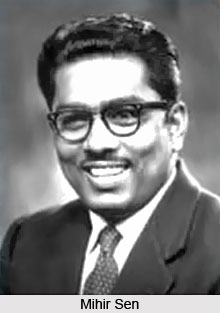 Mihir Sen is one of the feted swimmers of India who attained world-wide fame for swimming the English Channel. In fact he was the first Indian and also the first Asian to cross the English Channel in 14 hours and 45 minutes on 27th September, 1958.
Mihir Sen is one of the feted swimmers of India who attained world-wide fame for swimming the English Channel. In fact he was the first Indian and also the first Asian to cross the English Channel in 14 hours and 45 minutes on 27th September, 1958.
Mihir Sen was an Indian swimmer, best known for being the first Asian to swim the English Channel in 1958, and for being the first swimmer ever to have crossed the Palk Straits.
Early life of Mihir Sen
He was born on November 16, 1930, in Purulia, West Bengal to physician Ramesh Sen and his wife, Lilabati. Largely due to the efforts of his mother Lilabati, the Sens moved to Cuttack when Mihir was eight, as Cuttack had better schools.
Caught in the grip of poverty, nonetheless Mihir would go on to graduate with a degree in law from the local Utkal University. He went to England to prepare himself for the bar but was pulled back by his dire finances and due to the initial lack of support from the then chief minister of Orissa. Nonetheless, in 1950, he managed to board a ship heading for England with the chief minister`s help. He had a suitcase, a princely sum of Å“10 and a one-way third class ticket.
Career of Mihir Sen
In 1966, Mihir Sen swam across the Palk Strait that extends for forty miles and also swam through the Strait of Gibraltar, lying between Morocco and Spain, the Strait of Bosphorus, and the Strait of Dardanelles. Altogether Mihir Sen set up five world records as he swam across the seven seas.
His name became a part of the Guinness Book of World Records. Mihir Sen thus became the trendsetter whose courageous feats in the enormous seas inspired the aspiring Indian swimmers to indulge in long distance swimming. Mihir Sen was actually a lawyer by profession, but he is much renowned as a distinguished long-distance Indian swimmer. Mihir Sen was awarded the Padma Shri and Padma Bhushan.
A victim of Alzheimer`s disease for the past 17 years, abandoned by relatives, friends and well-wishers, Mihir Sen says very little, recognises virtually nobody and remembers absolutely nothing. If that isn`t bad enough for the once-sturdy, tenacious and proud athlete, who dared to dream big but has now been deserted by his own glorious memories, the nation, too, seems to have forgotten his feats of endurance as a swimmer.
Saraf, of course, is not leaving it at that. He is now praying for much more than a miracle: help from either Doordarshan or Films Division-two government organisations not known to react with alacrity to emergencies, especially those that do not involve politicians-in locating recordings of Mihir Sen`s English Channel and Palk Straits conquests or of the investiture ceremony where he received his Padma Shri. "It could bring his memory back," says Saraf, with beguiling optimism. "Now that the physical recovery has been achieved, I would like to nurse him back to full mental health."
Personal life of Mihir Sen
Mihir Sen`s estranged wife, Bella, a half-British, half-Hungarian typist whom the swimmer met in London while studying law, is in Calcutta. But she`s visited the Anandalok hospital no more than twice, since Sen was admitted. The swimmer`s neighbours in the posh Alipore area, too, have no time for a man who is of little use to them. Says a shopkeeper in the market where local residents buy their daily provisions: "We rarely saw him in all these years, let alone being aware of the seriousness of his ailment." Callousness, according to an indignant Saraf, is our greatest ailment. "It`s perhaps far worse than the serious diseases that have afflicted Mihir Sen," he says. But sadly, there is no cure for it. This is my tribute to Mihir Sen, who in my opinion achieved a task more Herculean than winning an Olympic gold medal. Exactly 50 years ago, on September 27th 1958 he became he Ist Indian to swim the English Channel Later he became the Ist person to swim all the 7 straits of he World. He achieved this against all the odds as in that Era it was an almost impossible task. It reminded you of Russia triumphing in the Battle of Stalingrad. It is tragic that he is forgotten in this day and age. A memorial should have been made for him. A book could have been written on him. His arduous preparation methods were a chapter in itself.




